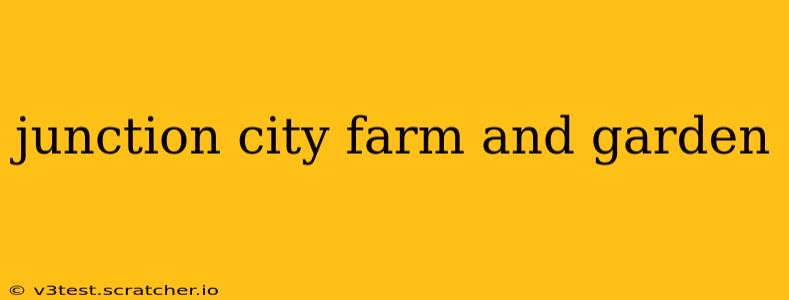Junction City Farm and Garden isn't just a farm; it's a vibrant community hub fostering local food systems, environmental stewardship, and educational opportunities. This detailed exploration dives into what makes Junction City Farm and Garden unique, addressing common questions and providing insights into its operations and impact. While specific details may vary depending on the location (as there may be multiple initiatives using similar names), this article aims to capture the essence of such community-focused agricultural projects.
What is Junction City Farm and Garden?
Junction City Farm and Garden (assuming a specific location exists; otherwise, this will describe the general concept) is likely a multifaceted operation combining agricultural production with community engagement. This could include elements like:
- Sustainable Farming Practices: Employing methods like crop rotation, composting, and integrated pest management to minimize environmental impact and maximize soil health.
- Community Gardens: Providing plots for residents to grow their own food, fostering a sense of community and local food security.
- Educational Programs: Offering workshops, classes, and volunteer opportunities to educate the public about sustainable agriculture, gardening techniques, and food systems.
- Farmers' Markets or CSA: Potentially operating a farmers' market or Community Supported Agriculture (CSA) program, providing fresh, locally-grown produce directly to consumers.
- Environmental Initiatives: This could include habitat restoration, water conservation projects, or educational programs focused on environmental sustainability.
Where is Junction City Farm and Garden located?
The precise location of a farm or garden with that name would depend on the specific initiative. To find its exact address, a quick online search using "Junction City Farm and Garden" along with any relevant geographical information (city, state, country) should yield results.
What types of produce does Junction City Farm and Garden grow?
The variety of produce grown will depend on factors such as climate, soil type, and the farm's specific goals. A typical farm might grow a diverse range of fruits, vegetables, and herbs, prioritizing seasonal crops and those well-suited to the local environment. This could include anything from leafy greens and root vegetables to berries and stone fruits.
Does Junction City Farm and Garden offer any educational programs or workshops?
Many community-focused farms and gardens offer educational opportunities. These could range from hands-on gardening workshops for children and adults to more in-depth classes on sustainable farming practices or food preservation techniques. Checking their website or contacting them directly is the best way to discover current offerings.
How can I get involved with Junction City Farm and Garden?
Depending on the specific organization, there are likely several ways to participate. This might include:
- Volunteering: Many farms rely on volunteers to help with various tasks, from planting and harvesting to weeding and maintenance.
- Donating: Financial contributions can support their operations and expansion.
- Purchasing Produce: Supporting the farm by buying their produce directly strengthens the local food system.
- Attending Events: Keep an eye out for workshops, farmers' markets, or other community events they host.
What are the benefits of supporting Junction City Farm and Garden?
Supporting a local farm like this has numerous benefits, including:
- Access to Fresh, Healthy Food: Enjoy locally grown, seasonal produce.
- Community Building: Participate in a community-focused initiative.
- Environmental Stewardship: Support sustainable farming practices that benefit the environment.
- Economic Development: Support local businesses and contribute to the local economy.
- Educational Opportunities: Learn about sustainable agriculture and food systems.
This detailed overview provides a comprehensive understanding of Junction City Farm and Garden (or similar initiatives). Remember to search for the specific location to find precise information on location, offerings, and involvement opportunities. Their website and social media pages are invaluable resources for staying up-to-date on their activities and programs.
